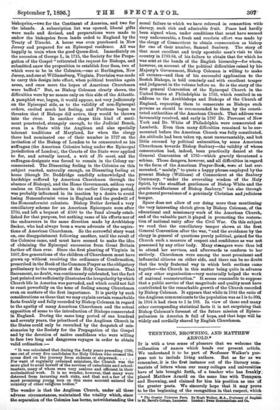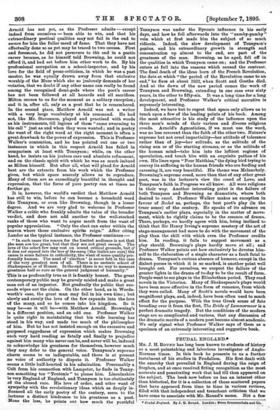TENNYSON, BROWNING, AND MATTHEW ARNOLD.*
IT is with a true sense of pleasure that we welcome the collocation of names which heads our present article. We understand it to be part of fizofessor Walker's pur- pose not to include living authors. But as far as we remember, it is the first instance out of the literary sum- marists of letters whom our many colleges and universities have of late brought forth, of a teacher who has frankly , placed Matthew Arnold on the same line with Tennyson and Browning, and claimed for him his position as one of the greater poets. We sincerely hope that it may prove to be the beginning of the recognition in that respect, which • The Greater Victorian Poets. By Hugh Walker. M.A., Professor of English in St. David's College. 'Ammeter. London s Swan Sonneosehein and 0o.,
Arnold has not yet, as the Professor admits — except indeed from ourselves — been able to win, and that his extraordinary poetical qualities may not fail in the end to secure for him the fuller weed of fame. That they have not effectually done so as yet may be traced to two causes. First and foremost, he did not persevere to tlie end in a poetic career because, as he himself told Browning, he could not afford it, and had set before him other work to do. By his professional occupation as a school-inspector, and by his 'love for the field of prose-criticism, in which he was a past master, he was equally drawn away from that exclusive worship of the Muse which she so jealously demands of her 'votaries, that we doubt if any other name can really be found among the recognised demi-gods where the poet's career has not been followed at all hazards and all sacrifices. Milton occurs to us for the moment as a solitary exception; and it is, after all, only as a poet that he is remembered.
In the second place, Matthew Arnold was not a writer with a very large vocabulary at his command. He had not, like Mr. Stevenson, played and practised with words as his instruments, till legions of them "came swarming to his call" just as and when they were wanted ; and in poetry the want of the right word at the right moment is often a great drawback to the power of expression. This is Professor Walker's contention, and he has pointed out one or two instances in which in this respect Arnold has failed in oomparison at least with Tennyson; while, on the other hand, he insists on his jealous care and absolute refinement, and on the classic spirit with which he was as much imbued as Milton himself. But after all, what will plead for Arnold best are the extracts from his work which the Professor gives, but which space scarcely allows us to reproduce. Many of them are so exceedingly beautiful in thought and expression, that the force of pure poetry can at times no further go.
It is, however, the world's verdict that Matthew Arnold has still to win, before he can become a household word like Tennyson, or even like Browning, though in a lesser degree. And we are very glad to welcome in Professor Walker a critic who frankly admits the value of the broader verdict, and does not add another to the well-stocked ranks of those who want to argue merit from the want of popular appreciation. " Only the elect can enter within the heaven where those exclusive spirits reign." After citing Landor as the typical instance, the Professor continues :-
" In such cases the reason for the limited audience is not that the men are too great, but that they are not great enough. The love of the select few may rest on sound critical grounds, but if it does not expand into the love of the many [the italics are ours] the cause is some failure in catholicity, the want of some quality pro- foundly human. The need of ' election ' is never felt in the case of the very greatest men of all. There is no esoteric school of Shakespeare or of Homer. In the end there is no way to measure greatness half so sure as the general judgment of humanity."
This is as profoundly true as it is frankly honest. The great contemporary public may be gravely misled and make a great man out of an impostor. But gradually the public that suc- ceeds wipes out the claim. On the other hand, as in Words-
worth's case, the great man may fail in his own time ; but
slowly and surely the love of the few expands into the love of the many, and so he comes into his kingdom. So it may be—so it will be—with Matthew Arnold. Browning's is a different position, and an odd one. Professor Walker is quite right in maintaining that his wide learning has stood in his way, and made too much of the philosopher of him. But he has not insisted enough on the excessive and purposed ruggedness of expression which makes Browning such very hard reading as fatally and finally to prejudice against him many who never can be, and never will be, induced to acknowledge his greatness for themselves, however much they may defer to the general voice. Tennyson's supreme charm seems to us indisputable, and there is at present no voice of authority to dispute it. Professor Walker seems a little half-hearted in his admiration. Presumably a Celt from his connection with Lampeter, he finds in Tenny. .son something too " Teutonic " to please him. Lincolnshire is very England of England, and Tennyson is too obstinately of the abused race. His love of order, and utter want of sympathy with the revolutionary ideas which so deeply in- fluenced all the early poetry of the century, seem to the lecturer a distinct hindrance to his greatness as a poet. None the less, he points out how much the youthful
Tennyson was under the Byronic influence in his early days, and how he fell afterwards into the "namby-pamby" vein which at first made him the subject of so much ridicule. Indeed, the slow development of Tennyson's genius, and his extraordinary growth in strength and concentration up almost to the end, are part of the greatness of the man. Browning, as he aged, fell off in the qualities in which Tennyson came on ; and the Professor enters at full into the reasons which caused the contrast. The final death of the ideas born of the French Revolution, the date at which "the period of the Revolution came to an end," he fixes at about 1832, when Scott and Goethe died. And at the dawn of the new period comes the work of Tennyson and Browning, extending in one case over sixty years, in the other to fifty-six. It was a long time for a long development, and Professor Walker's critical narrative is supremely interesting.
Indeed, we have but to regret that space only allows us to touch upon a few of the leading points of his book. Among the most attractive is his study of the influence upon the three men's minds of their various and diverse religions creeds. Arnold's Agnosticism, if we must use the word, was no less reverent than the faith of the other two. Nature's supreme but not cruel impartiality—her attitude of tolerance rather than of joy—her solitude, as the solitude of the rising sun or of the starting streams, or as the solitude of the human mind—take him into the loftiest regions of speculation, and touch him with an exquisite pathos of his own. His lines upon " Poor Matthias," the dying bird trying to convey its suffering to the human friends who are feeding and caressing it, are very beautiful. His theme was Melancholy. Browning's supreme creed, more than that of any other great poet, was in the lecturer's view the creed of Love, and Tennyson's faith in Progress we all know. All were religions in their way. Another interesting point is the failure of both Tennyson and Browning as dramatists, where both desired to excel. Professor Walker makes an exception in favour of Becket as, perhaps, the best poet's play (in the truer sense) of the century. He speaks of its advance on Tennyson's earlier plays, especially in the matter of move- ment, which he rightly claims to be the essence of drama. There, perhaps, we hardly agree with him, being inclined to think that Sir Henry Irving's supreme mastery of the art of stage-management had more to do with the movement of the play than the skill with which even the Professor credits him. In reading, it fails to suggest movement as a play should. Browning's plays hardly move at all ; and Professor Walker points out how exclusively he devotes him- self to the elaboration of a single character as a fault fatal to drama. Tennyson's curious absence of humour, except in the dialect poems in which it is so marked, is another point well brought out. For ourselves, we suspect the failure of the greater lights in the drama of to-day to be the result of form. People went to see plays in the Elizabethan period. They read novels in the Victorian. Many of Shakespeare's plays would have been more effective in the form of romance, from which they were culled. Many of Scott's novels would have been magnificent plays, and, indeed, have been often used to much effect for the purpose. With the true Greek sense of fate brooding over it from the first, The Bride of Lammermoor is a perfect dramatic tragedy. But the conditions of the modern stage are so complicated and various, that any discussion of the dramatic merits of a modern poet become almost academic. We only signal what Professor Walker says of them as a specimen of an extremely interesting and suggestive book.



































 Previous page
Previous page